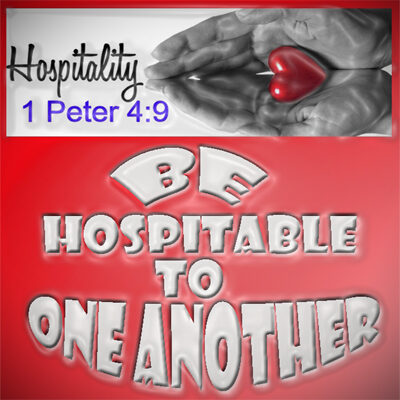Sermons by David Scarpino (Page 3)
Hospitality is a command not an option or choice and one of those things that must have become a lost art with many in the church today.
Some may remember when everyone on your street was known by name. Back when a “stranger”, that is a new person or family moved into the neighborhood—people would bring them welcoming pies and goodies along with an invitation to dinner or family barbecue—and before you know it, they are no longer strangers.
I hope that in this little part of our study from God’s word we will find spiritual resolve and strength to reverse the inhospitable trend among many of the people of God.
THINGS PRECIOUS TO GOD PART 2
What things do you hold precious? Wife, children, grandchildren? Is there something that you own that you hold precious? We all have something that is so important to us that we would fight, even die for it. What is that in your life?
But, truth be known, if what you hold precious most is not to be in heaven in the after while, then you are susceptible to falling short of that home in heaven. When Jesus counseled the rich young ruler who asked Jesus “…what shall I do that I may inherit eternal life?” (Mark 10:17), the ultimate answer Jesus gave, “One thing you lack: Go your way, sell whatever you have and give to the poor, and you will have treasure in heaven; and come, take up the cross, and follow Me” (Mark 10:21). We know that young ruler went away sorrowfully, because at the time he had possessions that were precious to him (v.21).
Jesus said, “He who loves his life will lose it, and he who hates his life in this world will keep it for eternal life.” (John 12:25). Knowing what is precious to God is a great way to learn to see things God’s way. To value what He values – to know what is important to God. There are so many things we could talk about—it’s an endless list and understanding them—helps us set our priorities accordingly.
In this part two we’ll finish up the things that our Bibles describe as being precious in the sight of God. We begin with unity of the saints is precious to God…
What things do you hold precious? Wife, children, grandchildren? Is there something that you own that you hold precious? We all have something that is so important to us that we would fight, even die for it. What is that in your life?
But, truth be known, if what you hold precious most is not to be in heaven in the after while, then you are susceptible to falling short of that home in heaven. When Jesus counseled the rich young ruler who asked Jesus “…what shall I do that I may inherit eternal life?” (Mark 10:17), the ultimate answer Jesus gave, “One thing you lack: Go your way, sell whatever you have and give to the poor, and you will have treasure in heaven; and come, take up the cross, and follow Me” (Mark 10:21). We know that young ruler went away sorrowfully, because at the time he had possessions that were precious to him (v.21).
Jesus said, “He who loves his life will lose it, and he who hates his life in this world will keep it for eternal life.” (John 12:25). Knowing what is precious to God is a great way to learn to see things God’s way. To value what He values – to know what is important to God. There are so many things we could talk about—it’s an endless list and understanding them—helps us set our priorities accordingly.
In this two part lesson I want to consider just a few things that our Bibles describe as being precious in the sight of God.
We have all heard phrases like, “Before I leave—let me just say”, or “Before I go let me leave you some final thoughts”, and then there is in conclusion let me leave you with these thoughts”. In closing his first letter to the saints in Corinth—Paul offers 5 admonitions.
Thus, the lesson today is thus called, “Five Admonitions”. They are 1. Watch, 2. Stand Fast in the Faith, 3. Be Brave 4. Be Strong, and 5. Let all that you do be done with love.
In the Previous lesson we looked at the first two, this lesson will pick up at the third admonition which is, “Be Brave”…
We have all heard phrases like, “Before I leave—let me just say”, or “Before I go let me leave you some final thoughts”, and then there is in conclusion let me leave you with these thoughts”. In closing his first letter to the saints in Corinth—Paul offers 5 admonitions. Thus, the lesson today is thus…
For Every Season God Has A Reason
For the next few minutes I’d like to consider with you the words of Solomon from Eccl. 3:1-8 where he wrote, “1 To everything there is a season, a time for every purpose under heaven: 2 A time [a]to be born, and a time to die; A time to plant, and a time to pluck what is planted; 3 A time to kill, and a time to heal; A time to break down, and a time to build up; 4 A time to weep, and a time to laugh; A time to mourn, and a time to dance; 5 A time to cast away stones, and a time to gather stones; A time to embrace, and a time to refrain from embracing; 6 A time to gain,
and a time to lose; A time to keep, and a time to throw away; 7 A time to tear, and a time to sew; A time to keep silence, and a time to speak; 8 A time to love, and a time to hate; A time of war, and a time of peace.”
Let us touch on just a few of these…
Looking back over the years we all can see many changes. Some Good-Some Not So Good. For example: We used to walk (2.5 mph), then we road horses (10 mph), then the first power automobile(18 mph), now we have electric cars (100 mph) and jet airlines (600 mph). Our lives are filled with things that change: Abacus/to computers, phone on the wall/to cell phones on your wrist, outhouse to …YOU GET THE POINT.
We can be thankful for many of the changes such as advances in Medical Technology, modern conveniences in the home and work place, and some things we might take for granted like heating in the winter and A/C in the summer, grocery stores, refrigerators, gas or electric stoves and indoor plumbing. But there are some things that cannot change. In this lesson we’ll examine a few things that cannot change.
Solomon said, “That which has been is what will be, that which is done is what will be done, and there is nothing new under the sun.” (Eccl. 1:9). When we hear this we understand Solomon is talking about life and spiritual things—not physical, like technology etc., There will always be birth—and death—that does not change, the sun always rises in the east and sets in the west, seasons change—rain comes—droughts come—truth and lies are told. Man’s nature is the same today as it was when Adam and Eve were taken from the garden.
The same is true about God’s nature—it is the same always—because God is eternal—without beginning and without an end. Turn to 1 John chapter 4 and let’s talk about our first point.
One thing that will never change: It’s God’s Nature…
Our lesson comes from Paul’s letter to the Ephesians where he commanded them to, “31 Let all bitterness, wrath, anger, [a]clamor, and evil speaking be put away from you, with all malice. 32 And be kind to one another, tenderhearted, forgiving one another, even as God in Christ forgave you.” (Ephesians 4:31-32).
How then do we fulfill this command? Paul says to the church, “Let each of you look out not only for his own interests, but also for the interests of others” (Phil. 2:4), and Peter said, “all of you be of one mind, having compassion for one another; love as brothers, be tenderhearted, be [a]courteous;” (1 Pet. 3:8).
Clearly, being Kind to one another incorporates having interest in each other, love and compassion. Without a doubt—it really helps to be of one mind…through the Spirit of truth—the word of God.
The first thing that Paul commands is that we put away 5 things from ourselves: bitterness, wrath, anger, clamor or quarreling and evil speaking. These individually – promote division. Separating us from one another—destroying what God wants for us. The first thing that Paul commands we put away is Bitterness. Shakespeare says: If each man gets his deserts, ‘who of us shall scape whipping?’ (Shakespeare)
Bitterness is a result of our inability to forget the “bad” things that happened in the past. . .
The question we must all ask ourselves—are there things that someone said, or did that we just cannot forget—that have cause bitterness in our hearts?
John said…
“1 After these things I looked, and behold, a door standing open in heaven. And the first voice which I heard was like a trumpet speaking with me, saying, “Come up here, and I will show you things which must take place after this.” 2 Immediately I was in the Spirit; and behold, a throne set in heaven, and One sat on the throne. 3 [a]And He who sat there was like a jasper and a sardius stone in appearance; and there was a rainbow around the throne, in appearance like an emerald. 4 Around the throne were twenty-four thrones, and on the thrones I saw twenty-four elders sitting, clothed in white [b]robes; and they had crowns of gold on their heads.” (Revelation 4:1-4).
In Revelation chapters 4 and 5 John is privileged to see, and witness something wonderful. John records for us a description of a scene around the throne in heaven in which the Lord is receiving the praise which He alone deserves. In the vision John emphasized three reasons why the Lord was worthy of the praise He was receiving.
We begin with He was Praised because of Creation…
In our last Sunday evening message titled, “Put Them In Remembrance”. If you heard it you would have heard how Peter himself knew the need to provide constant reminders for the saints (2 Peter 1:9-15).
In this lesson we are going to follow Paul’s advice to Timothy where Paul says, “If you instruct the brethren in these things, you will be a good minister of Jesus Christ, nourished in the words of faith and of the good doctrine which you have carefully followed” (1 Tim. 4:6).
Most importantly, we must always be reminded that the preacher’s commission is not to find “new things” to preach on, rather he is to, “Preach the word! Be ready in season and out of season. Convince, rebuke, exhort, with all longsuffering and teaching” (2 Tim. 4:2). There is good reason, “For the time will come when they will not endure sound doctrine, but according to their own desires, because they have itching ears, they will heap up for themselves teachers; ” (v.3).
There are three points I will bring to your attention, they are:
(1) The Spirit’s Warning,
(2) Our Conscience Can Be Seared, and
(3) that Everything from God is Good.
As important today as in the first century. Paul said, “Now the Spirit expressly says that in latter times some will depart from the faith, giving heed to deceiving spirits and doctrines of demons,” (1 Tim. 4:1).









